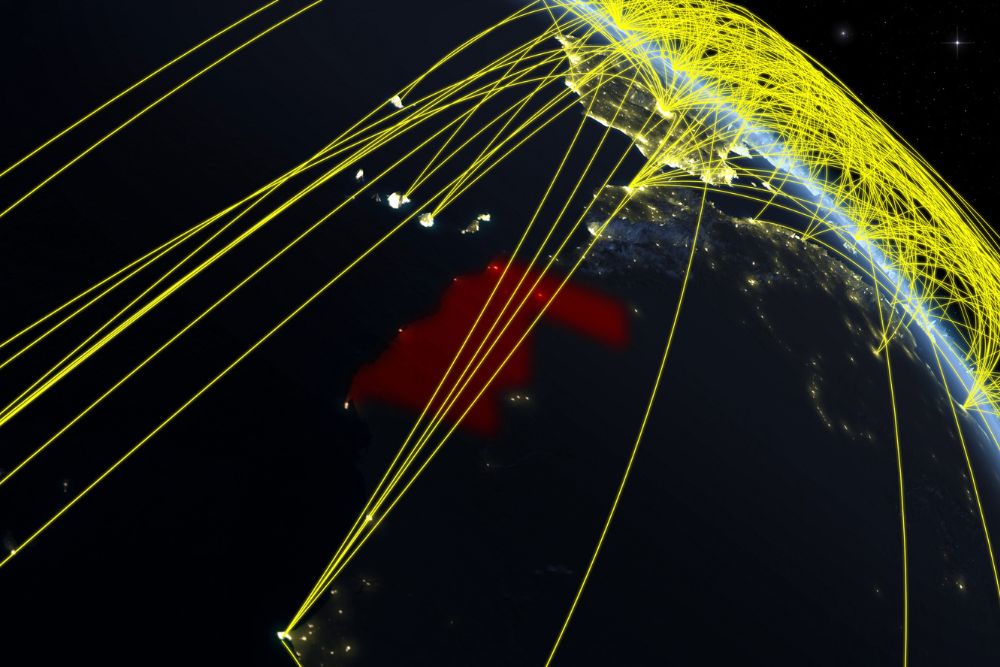
Years ago, when cloud storage and backups became widely available, some of our customers at RB’s Computer Service would ask “where is the cloud?” This question seems almost comical today, but back in the day, it was somewhat legit. After all, many businesses used to store and backup their data on their own on-site servers. Fast forward to today, we recently had a customer ask us “where the Dark Web was?” With movies and streaming TV shows portraying criminals using the Dark Web for their plots and law enforcement simultaneously using it to foil them, it was probably just a matter of time before this question came up. As a result, the team at RB’s Computer Service thought it would be a great time to write a blog about the Dark Web; what it is, how it works, the risks in using it, and how to stay safe on it.
What is the Dark Web?
The Dark Web refers to a hidden part of the internet. You can’t get to it from traditional search engines like Google or Bing. It exists within the Deep Web, which includes all online content not accessible through standard search engines—such as private databases, password-protected sites, and internal business networks. The Dark Web is specifically a subset that requires special software, like Tor (The Onion Router) or I2P (Invisible Internet Project), to access.
How It Works
 The Dark Web operates on encrypted networks, masking users' identities and locations through layers of rerouted traffic. The Tor network, for example, bounces users' internet activity through multiple nodes worldwide, making it nearly impossible to trace their location. Websites on the Dark Web often use the “.onion” domain suffix, which standard browsers can't access.
The Dark Web operates on encrypted networks, masking users' identities and locations through layers of rerouted traffic. The Tor network, for example, bounces users' internet activity through multiple nodes worldwide, making it nearly impossible to trace their location. Websites on the Dark Web often use the “.onion” domain suffix, which standard browsers can't access.
Risks of the Dark Web
The anonymity of the Dark Web makes it a haven for cybercrime, scams, and illicit transactions. Many Dark Web marketplaces operate through cryptocurrencies like Bitcoin, making it harder to track financial exchanges. Law enforcement agencies, such as the FBI and Europol, frequently monitor and work to take down illegal operations. While not everything on the Dark Web is illegal, caution is crucial. It can expose users to cyber threats, including malware, ransomware, phishing scams, and government surveillance. Accidentally clicking on something illegal on the Dark Web could trigger “guilt by association” suspicions by law enforcement, or worse.
Who uses the Dark Web and Why?
The Dark Web is a catch-22. It is a place for privacy advocates and criminals alike. It provides anonymity but also harbors risks that require careful navigation and is used both in legal and illegal activities. Some legitimate and illegal uses of the Dark Web include:
Legitimate Uses of the Dark Web
- Privacy and Anonymity – Some users, such as journalists, activists, and whistleblowers, use the Dark Web to communicate securely. It allows them to bypass censorship and avoid surveillance from governments or corporations.
- Accessing Restricted Information – In countries with strict internet censorship, people use the Dark Web to access news, social media, or other blocked content.
- Secure Communication – Platforms like SecureDrop allow whistleblowers to leak information to journalists safely.
- Cryptocurrency Transactions – Some users conduct legal cryptocurrency transactions with added privacy.
- Research and Education – Cybersecurity professionals and law enforcement monitor Dark Web activity to study cyber threats and criminal activity.
Illegal Uses of the Dark Web
While privacy and anonymity can be beneficial, cybercriminals exploit this aspect of the Dark Web. Like a masquerade ball, cybercriminals wear a mask on the Dark Web, and no one reveals their true name to engage in illegal activity such as:
- Black Markets – Some sites sell illegal goods like drugs, weapons, and stolen data.
- Cybercrime Services – Hackers offer services such as selling malware, conducting cyberattacks, or selling stolen identities.
- Illegal Content – The Dark Web has been associated with illegal content, including counterfeit documents and human trafficking.
- Fraud and Scams – Some users engage in financial fraud, such as selling stolen credit card information.
Can the Average Computer User Get Hacked on the Dark Web?
 Yes, the average computer user can get hacked on the Dark Web, but the risk depends on their actions and awareness. The Dark Web itself isn't inherently dangerous—it's simply a hidden part of the internet that requires special software like Tor to access. However, the real dangers come from interacting with malicious actors and engaging in risky behaviors. Below are some ways you can get hacked on the Dark Web:
Yes, the average computer user can get hacked on the Dark Web, but the risk depends on their actions and awareness. The Dark Web itself isn't inherently dangerous—it's simply a hidden part of the internet that requires special software like Tor to access. However, the real dangers come from interacting with malicious actors and engaging in risky behaviors. Below are some ways you can get hacked on the Dark Web:
Clicking on Malicious Links. Just like on the regular internet, phishing scams and malware-infected links are common. Many Dark Web marketplaces and forums are filled with hackers looking to steal personal data.
Downloading Infected Files. Users searching for leaked software, illegal content, or hacking tools may unknowingly download malware. These can include keyloggers (which track what you type), remote access trojans (which give hackers control of your device), and ransomware (which locks your files until you pay a ransom).
Using Weak or Reused Passwords. If you use the same password across multiple accounts, hackers can exploit stolen credential databases to break into your accounts. Many password dumps are sold on the Dark Web.
Failing to Use Proper Anonymity Tools. The Tor browser helps anonymize users, but it’s not foolproof. If a user logs into personal accounts, uses an unprotected connection or exposes identifying details, they can be tracked.
Visiting Fake or Compromised Websites. The Dark Web is filled with scams. Some sites pretend to be legitimate marketplaces but are phishing traps designed to steal login credentials or cryptocurrency.
How to Stay Safe on the Dark Web
RB’s Computer Service has written extensively about cybersecurity and how you can protect yourself online. To learn more about RB’s cybersecurity recommendations, check these helpful blogs, “4 Easy Tasks to Supercharge Computer Security” and “Are You Big Enough to Pay Ransomware?” If you need help implementing a comprehensive computer and network security plan, contact RB’s Computer Service today, we would be glad to help at help@rbsmn.com or call us at 763-441-3884. In the meantime, here are some good tips:
- Never enter personal information on any Dark Web site.
- Avoid downloading files, especially from untrusted sources.
- Use strong, unique passwords and enable two-factor authentication.
- Use a VPN to add another layer of anonymity.
- Stick to legitimate cybersecurity research if you're just exploring.
- While the Dark Web is often associated with crime, it also hosts privacy-focused forums, whistleblower sites, and secure communication platforms. However, for the average user, it poses more risks than rewards. If you don’t have a purpose to be there, it makes sense to steer clear of it.
Bottom Line
 Someone coined the phrase “curiosity killed the cat” and someone else once said, “even if you don’t want it, if you continue to visit the barber shop, sooner or later you’ll get a haircut.” If you don’t have a purpose for being on the Dark Web, it probably makes sense to steer clear of it. But if you have a reason to be on the Dark Web and you are concerned about cybersecurity, contact RB’s Computer Service today, we would be glad to help at help@rbsmn.com or call us at 763-441-3884. In addition to cybersecurity, RB’s Computer Service provides ransomware strategies and sells the best commercial-grade firewall routers, best laptop computers, best desktop computers, business computers, computer parts, and computer monitors. We also provide computer repair, iPhone and smartphone repair, and tablet repairs to customers and clients throughout central Minnesota and St. Cloud.
Someone coined the phrase “curiosity killed the cat” and someone else once said, “even if you don’t want it, if you continue to visit the barber shop, sooner or later you’ll get a haircut.” If you don’t have a purpose for being on the Dark Web, it probably makes sense to steer clear of it. But if you have a reason to be on the Dark Web and you are concerned about cybersecurity, contact RB’s Computer Service today, we would be glad to help at help@rbsmn.com or call us at 763-441-3884. In addition to cybersecurity, RB’s Computer Service provides ransomware strategies and sells the best commercial-grade firewall routers, best laptop computers, best desktop computers, business computers, computer parts, and computer monitors. We also provide computer repair, iPhone and smartphone repair, and tablet repairs to customers and clients throughout central Minnesota and St. Cloud.
References
What is the dark web? How to access it and what you’ll find
The Dark Web Explained: How It Works & Why It's So Dangerous
https://www.aura.com/learn/dark-web
Five Things to Know About the Dark Web
https://www.peraton.com/news/five-things-to-know-about-the-dark-web/
